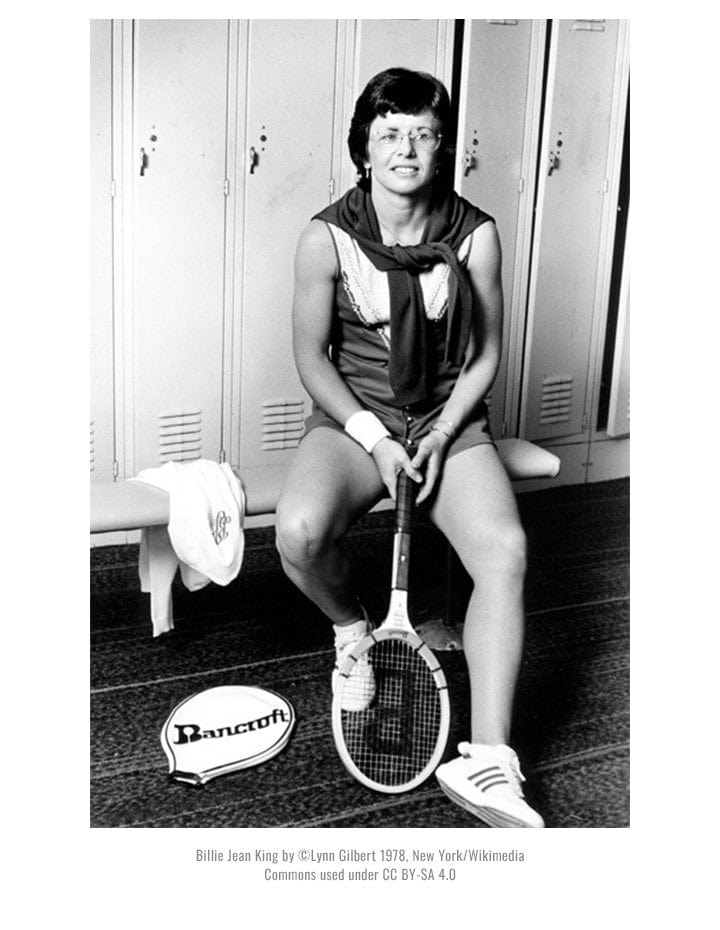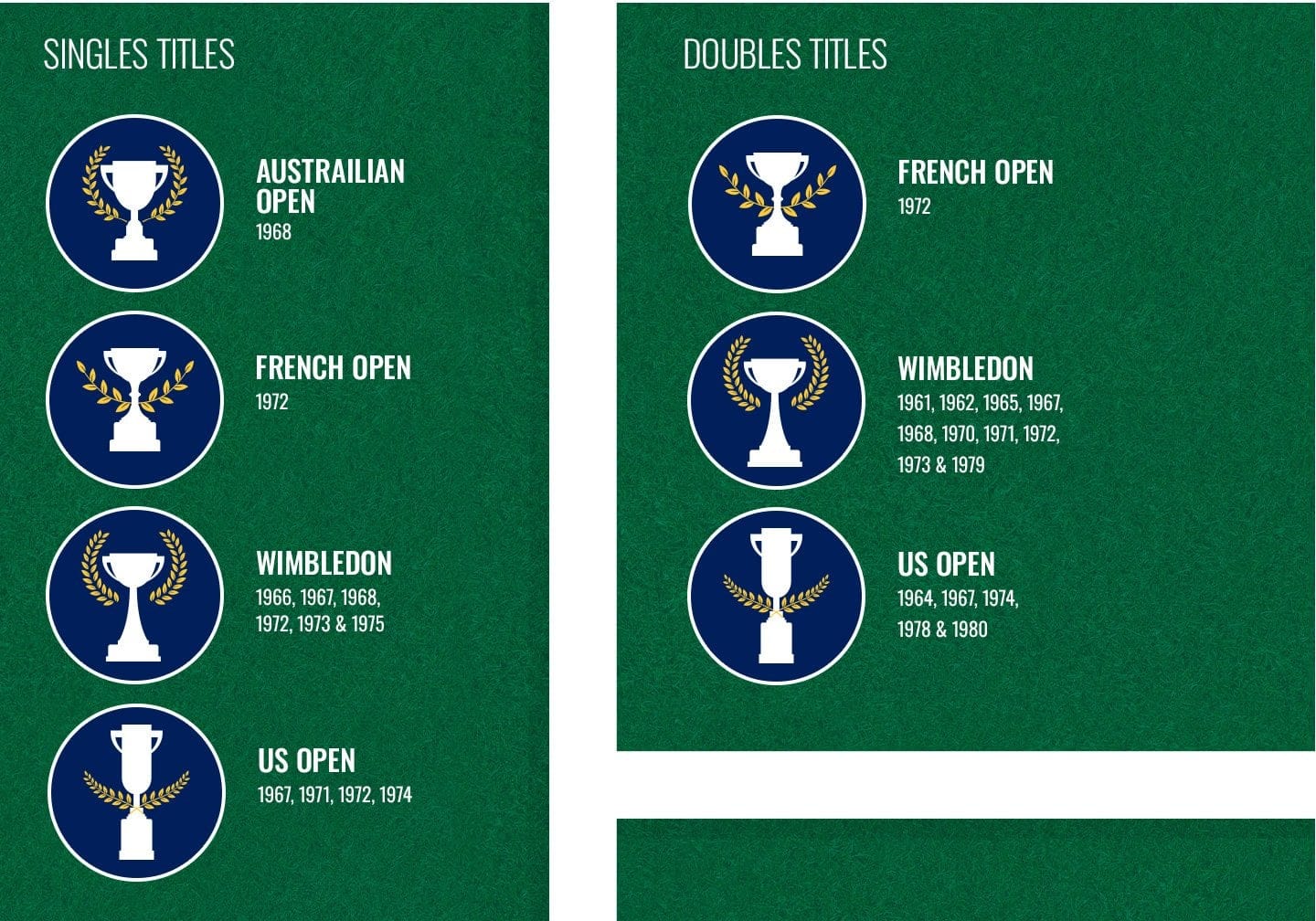
PLAYER PROFILE: BILLIE JEAN KING
A trailblazer for women’s tennis, equal rights and also one of the greatest female tennis players of all time. Billie Jean King paved the way on court and off court from the 50s onwards with her guiding principles of equality, empowerment and access. She was only the 5th woman in history to win the singles title at all 4 Grand Slam events, a “career Grand Slam” in itself.



BILLIE JEAN KING: PROFILE
EARLY YEARS
The legend began speaking out even before she turned pro, clashing with tennis authorities over the fact that she was wearing shorts (that her mother had made) rather than a skirt that saw her excluded from a team photo.
By 1959, she turned pro, but it wasn’t until 1961 that she started accumulating many of her career wins at perhaps the tournament she is most closely associated with: Wimbledon.
She won the Women’s Doubles and retained the title the following year, although she did need some fundraising to make the 1961 tournament as she could not get a sports scholarship.
King finally won her first grand slam singles title after a lucky number 13 attempts at Wimbledon in 1966 at the age of 22, and from then onwards, the titles continued to roll in.
In 1972, she completed a career grand slam, winning all 4 grand slam singles titles and becoming only the 5th woman in history to do so. She also did the same in mixed doubles, with only a defeat in the Australian Open preventing her from doing the same in the women’s doubles.
In 1983, she became the oldest WTA player to win a tournament (Edgbaston Cup) at 39 years, 7 months and 23 days. She finally stopped playing in 1990, ending her career with the same percentage of wins (81.76%) in singles matches as John McEnroe.
WIMBLEDON DOMINANCE
Between 1961 and 1979, King won 6 singles titles, 10 doubles and 4 mixed doubles titles. Her dominance at Wimbledon was so great that she never failed to reach the semi-final in at least 1 event she entered out of a total of 22 competitions.
In 1973, King completed the Triple Crown, winning the singles, women's doubles and mixed doubles titles all in the same year. She became the first and only player to do so at Wimbledon.
The last of her Wimbledon titles came in the women's doubles in 1979, where she partnered with Martina Navratilova. This was to be her 20th title, breaking the record of 19 that was held by Elizabeth Montague “Bunny” Ryan and had stood for 45 years. Somewhat eerily, Ryan had died only the day before, at Wimbledon.
BATTLE OF THE SEXES
The ‘battle of the sexes’, as it was dubbed, took place in September 1973 between King and Bobby Riggs. Riggs had been the top men’s player in the 1930s and 40s (both in the amateur and professional game), and although in his 50s, he believed that he could still defeat the top women players as they were ‘inferior’.
Initially, King had turned down the opportunity to play Riggs, whereby he beat Margaret Court in 2 sets. However, the lure of a financial incentive of $100,000 (around $670,520 in today's money) plus the chance to lay down a marker for the women’s game saw King take him on.
The match was watched by an estimated 50 million people in the US and 90 million in 37 countries, and King won in 3 straight sets. King, however, took far more pride in promoting and establishing the women’s game through a new audience than beating a 55-year-old former professional.
“Out of frustration comes creativity”
King is perhaps the encapsulation of equality. In 1967, she heavily criticised the United States Lawn Tennis Association (USLTA) over their lack of professionalism and for keeping tennis players and the game as an amateur practice. Guess who won.
She also campaigned for equal prize money, something that is still ongoing to this day, but in 1973, her stance saw the US Open become the first major tournament to offer equal prize money for men and women.
She put the hard yards in to set up a professional women's tour with as close to equal pay as possible, especially when other women professed to be just playing for the love of the game, but it was her determination and sense of injustice that carried her on, leading her to become the first president of the Women’s Tennis Association (women’s players' union) in 1973.
"For three years, we had two tours, and because of their governments, [Martina] Navratilova and Olga Morozova had to play the other tour. Chris [Evert], Margaret [Court], Virginia [Wade], they let us do the pioneering work, and they weren't very nice to us. If you go back and look at the old quotes, they played for the love of the game, we played for the money. When we got backing and money, we were all playing together – I wonder why? I tried not to get upset with them. Forgiveness is important. Our job was to have one voice and win them over."
Social activism
Beyond her work in tennis, Billie Jean King has been a vocal advocate for LGBTQ+ rights and social justice. She openly discussed her homosexuality in 1981, becoming one of the first prominent athletes to do so. Her openness and courage in addressing her sexual orientation have had a profound impact on the visibility and acceptance of LGBTQ+ athletes.
Legacy
Billie Jean King retired soon after her final win in 1983, but her legacy in the sport will live on for generations. One of the first female athletes to disclose her homosexuality and champion LGBTQ+ rights, the first woman in sports history to win $100,000 in a single year and campaigning for equal prize money are just a few of the things that King will be remembered for - aside from her stellar list of tennis accomplishments.













